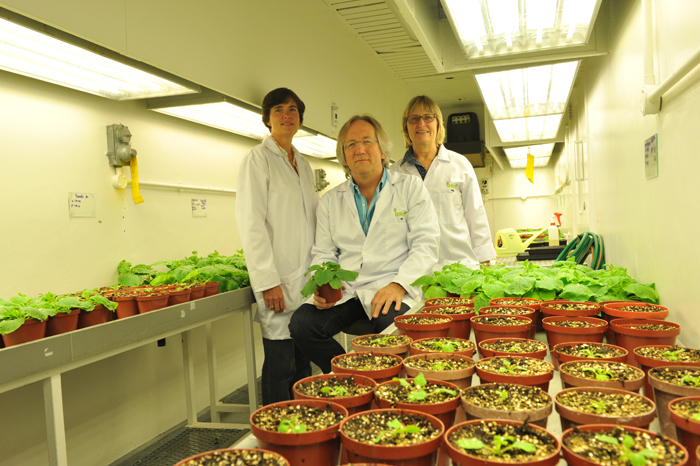Cheaper HPV vaccine might come from tobacco
14 March 2016 | Story Staff reporter. Photo Michael Hammond.
In a pioneering step towards using plants to produce vaccines against cervical cancer and other viruses, UCT researchers have generated synthetic human papillomavirus-derived viral particles called pseudovirions in tobacco plants.
“We've succeeded in making a completely mammalian viral particle in a plant – proteins, DNA, everything. That's enormously exciting,” says Dr Inga Hitzeroth of the Biopharming Research Unit (BRU) at UCT.
Biopharming uses plants as 'biological factories'. They have been used to create flu vaccines, potential Ebola drugs and an enzyme used to treat Gaucher's disease in people. Now, the BRU researchers report using tobacco plants to create synthetic viral particles known as pseudovirions. These pseudovirions look like viral infections, but contain no infectious viral DNA.
The shell of this newly created pseudovirion was of the human papillomavirus (HPV) type 16, which is responsible for more than 50% of cervical cancer cases worldwide. The core DNA, also produced in the plant, is derived from a plant DNA virus that multiplies only in plants, but can act as a DNA vaccine in animals.
This is the first time researchers have successfully created pseudovirions in plants – up to now, yeast and mammalian cell cultures have been the glass ceiling. The BRU team hope this new plant-based technology could one day be used to test future HPV vaccines.
First author of the study, Dr Renate Lamprecht, explains: “We need pseudovirions to test any new HPV vaccine candidates. At the moment it is very expensive to make pseudovirions – we need to make them in mammalian cell culture, it needs to be sterile, and the reagents are very expensive.”
As demonstrated by this study, plant-made pseudovirions could reduce the cost of manufacturing and testing vaccines, which will help to make HPV vaccines affordable, particularly in the developing world.
 This work is licensed under a Creative Commons Attribution-NoDerivatives 4.0 International License.
This work is licensed under a Creative Commons Attribution-NoDerivatives 4.0 International License.
Please view the republishing articles page for more information.










